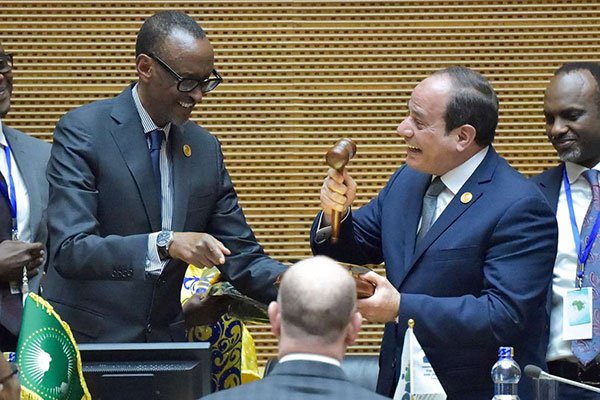The exit of Rwandan President Paul Kagame as the African Union chairman has left questions about the future of reforms that he initiated, whose implementation has been stalled by dithering by the continent’s biggest economies.
At the closing ceremony of the 32nd AU Heads of State Summit, Egyptian President Abdel Fattah Al-Sisi, who took over from President Kagame, refused to answer questions from journalists, as had been the tradition with his predecessor, raising fears that transparency may have gone out of the window.
But President Al- Sisi seemed to assure his peers about the reforms during his inauguration saying, “Egypt will work hard to continue the path of institutional, structural and financial reforms, and complete achievements realised, to develop the capabilities of the Union and its Commission to meet the aspirations and hopes of African people.”
But how he will achieve this remains to be seen, given that he has put security as his top priority.
Moreover, if South African President Cyril Ramaphosa wins elections later in May, then the rotational AU chairman’s post will be his for the taking in 2020, putting in further doubt, the AU reform implementation, because Pretoria has been seen to resist these changes.
Since taking charge of the reforms in 2016, President Kagame promised to wean the AU off donor funding and cut down on the number of summits and commissions. But with another summit scheduled in Niamey, Niger, in May, the gains made could be reversed.
He also pushed the African Continental Free Trade Area, though sub-Saharan Africa’s largest economy, Nigeria, is among countries that have not signed the deal. Still, out of the 22 required to ratify the agreement for it to take effect, 18 have done so.
President Kagame’s push to cut the commissions and make structural changes at the AU are his biggest win yet.
Sanctions
But financial autonomy has been slow in implementation after some members failed to agree on the proposal to levy a 0.2 percent tax on imports that would be channelled to the commission to run its activities.
Even though the members supported this idea, its implementation has been painstaking slow despite massive buy-ins with key members like South Africa, with former president Thabo Mbeki recently expressing his reservations.
In November 2018, the Special AU summit in Addis resolved to impose sanctions on countries for the non-payment of contributions, after it became clear that some members were stalling the 0.2 percent levy on eligible imports. The16-member Southern African Development Community, led by South Africa, has been resisting this.
On why some countries were stalling, Moussa Faki Mahamat, the chairperson of the AU Commission, said: “The ongoing institutional reform is one of the most ambitious initiatives for change ever taken by the Union. It touches on all aspects of its functioning and concerns all its organs. Previous attempts, let’s face it, failed to live up to expectations, leaving a bitter taste of unfinished business.”
The application of the 0.2 percent levy on eligible imports was President Kagame’s top priority, as he sought to end the Commission’s dependence on donors and other non-African countries for funding its activities. The levy, if executed, would raise $1.2 billion against AU’s average annual budget of $782 million, making it self-sustaining.


Leave a Reply